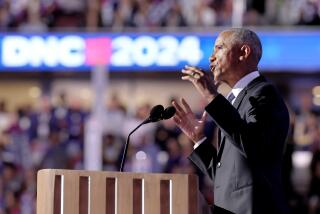COLUMN ONE : In Politics, the Defense Never Rests : The Clinton and Bush teams work around the clock to anticipate attacks and map out responses. But the campaigns’ broader messages may be lost amid the posturing.
- Share via
WASHINGTON — Around midnight, two men in Democrat Bill Clinton’s campaign headquarters in Little Rock, Ark., are just settling in to a strange nocturnal ritual.
In a mostly darkened office, they scour wire service reports, review that night’s evening news and pick through calendars of the next day’s political appearances around the country.
Their job is the new art of political reconnaissance: analyzing the message that came out in the daily press and mapping out where they think Republicans will appear the next day to attack their candidate.
By 7 the next morning, they are briefing Clinton’s high command. And by 7:30, Clinton’s presidential campaign has a refined plan of where it will send its allies in response and what they should say.
Back in Washington, a team from President Bush’s reelection campaign is doing much the same.
Running for President today has become an elaborate game of tracking and counterattacking; trying to anticipate every microphone the opposition wants to speak into and making sure that every charge is answered within hours--or, in the parlance of politics, inside the same news cycle.
This is the modern version of political defense, controlling one’s message in the news media through quick response. And while once only Republicans played, this year the Democrats think they are now in the game.
Earlier this week, for example, Clinton responded to a criticism of his health care plan by Bush even before the President had leveled it. Another day, Clinton’s campaign undermined criticism by South Carolina Gov. Carroll A. Campbell Jr. by quickly producing a letter the Republican leader had written praising Clinton a few years earlier.
“When this campaign is over, our response machine will become a legend,” one senior Clinton aide said confidently.
Republicans agree quick response is essential.
As Clinton and his running mate, Tennessee Sen. Al Gore, ventured on their bus trip from New York to St. Louis last month, the Bush campaign had local Republicans talking to the press in each town before and after the Democratic ticket visited. The GOP campaign also made Vice President Dan Quayle available for satellite interviews with local television stations’ news anchors on the days that Clinton and Gore passed through.
The objective, said Republican consultant Eddie Mahe, is to “try whenever possible to get inside your opponent’s story each day with your own positive message.”
And it is difficult to win in politics if one side keeps diluting your candidate’s message and you are not answering in kind.
There is some risk. A few Democrats have begun to worry that Clinton’s quick response was so effective this past week that publicity praising his defensive posturing overwhelmed his broader message about the economy. And in the long run, some say, answering charges from Bush is far less important than making a case for his own agenda.
“We are spending so much time worrying about (a strong response) that the risk is the tactic doesn’t eat the larger strategy,” said one Democratic adviser.
Nor, despite mistakes, is the Bush campaign as poor at counterpunching as some of the news media have made it seem, particularly in stories this week suggesting that Bush’s deputy campaign manager stepped out of bounds by issuing a particularly snide series of personal attacks about Clinton’s weight, morality and honesty.
“Bush’s problem is he doesn’t have enough to say, not that he is slow to respond,” said one frustrated Republican strategist.
‘Spin Doctors’
Not long ago, trying to manipulate the media seemed a relatively simple task. Campaigns sent out operatives, called “spin doctors,” to tell reporters what was happening in campaigns as a way of massaging the expectations with which the media would view events.
In those days, “the press secretary’s cardinal rule was hold your news event early in the morning so that the media would have more time to tell your story,” said Michael D. McCurry, a longtime Democratic media adviser.
If the art of managing one’s message has become far more elaborate, one reason is the perceived failures of Democrat Michael S. Dukakis’ 1988 presidential campaign.
“Our philosophy is, if there is anything that has been learned from the Dukakis campaign, it is that you cannot sit still and think you are taking the high ground,” said Clinton spokeswoman Avis Lavelle. “We will not sit still and be soundly beaten around the head.”
The Clinton operation begins with the nighttime efforts of its two staffers to thoroughly digest the day’s press stories and try to deduce where the various voices of the opposition will be heard from tomorrow.
“By 7:30, we are off and running,” said one aide.
Clinton ‘War Room’
The message and countermessage effort is then monitored throughout the day. The nerve center of the operation is a “war room” set up in Clinton headquarters under the charge of campaign strategist James Carville. A representative from every part of the campaign--research, speech writing, logistics, etc.--also is present in the room, which Carville patrols restlessly.
Communications director George Stephanopoulos gets a report around midday on how the flanking operation is working and makes any necessary adjustments by 1 p.m. At 7 p.m. the senior staff holds its nightly meeting to make preliminary plans for the next day.
Overnight, the campaign also faxes a “message of the day” to Democratic leaders across the nation who might be speaking for the campaign, including members of Congress.
“If a Bush surrogate comes to your state attacking Clinton, be ready to strike him down,” read a Clinton “National Talking Points” from last week. “And if a Bush surrogate from your state goes somewhere else, make him pay the price at home.”
The operation at Bush-Quayle headquarters is similar, from the overnight reconnaissance to a 7 a.m. meeting. “We have a team of people who watch everything (Clinton) does,” said communications adviser James Lake.
The “Daily Line for Republican Newsmakers” for Thursday, for instance, told GOP officials what Bush was expected to say later in the day on the campaign trail and what they might say to the press to reinforce him. The missive also began with a swipe at a phrase Clinton used in his acceptance speech, saying his “new covenant may be a new cover-up.” Both Bush and Quayle used variations on that phrase during campaign appearances later in the day.
Message of the Day
“To the maximum extent possible,” Lake said, “when Clinton announces a trip, we try to get surrogates into that market, both before and after him.” Invariably, Lake said, the press seems quite interested.
All this is something that Republicans refined to a high standard during the Ronald Reagan Administration, especially when James A. Baker III, now Bush’s secretary of state, served as White House chief of staff.
This year, the message of the day also has taken new forms, particularly as new kinds of media have become involved in politics.
When Ross Perot, then a presumed presidential candidate, was appearing on CNN’s “Larry King Live” talk show, the Bush campaign countered by having Republican National Committee Chairman Richard N. Bond call up and spar with him on the air. The news the next day focused on Bond’s attack.
There are other ways to launch surprise attacks. One of the most popular is to appear on satellite interviews in the local TV markets where the opponent is appearing, as Quayle did during the Clinton-Gore bus tour.
In refining this technique, the Bush Administration has gone as far as to build a television studio next to the White House that looks like the Oval Office, from which both Bush and Quayle can do interviews.
Tracking these interviews is difficult, but both campaigns have satellite dishes that attempt to do so. The dishes also are used to monitor feeds from the three commercial networks to their local affiliates.
At times, Clinton campaign aides simply troll outer space with their satellite, looking for video feeds being sent to local markets featuring Republican spokespersons. During an interview with a reporter this week, for instance, Carville stopped to hear from an aide that the campaign had succeeded in intercepting the NBC network feed to its affiliates that contained a Republican commenting on the day’s campaign events.
“It is the information age,” said one senior Clinton aide.
The campaigns also have watchers fanned out across the country who monitor local TV news whenever the opposition candidates are traveling, although both sides admit such operations are often imperfect.
The guiding principle of this modern political defense is that if a charge is left unanswered for even one day--meaning one night of evening news, one morning’s newspapers and morning news programs--it cannot be effectively answered.
“People barely pay attention to the current news,” said Republican consultant Mahe. “They pay no attention to old news.”
But not all charges are worth answering. “There is nothing more exhilarating than to be fired upon by the enemy without having to respond,” said Carville. “Some things need to be answered immediately and some can be ignored. That is part of the assessment process.”
Until recently, many Republicans had been worried that the Democrats were getting the better of the defensive game. “We have been laying back entirely too much,” Bush campaign press secretary Torie Clarke complained to reporters Monday.
To change that, the Bush campaign has started sending an “attack fax” to journalists each day.
One benefit to Clinton from his quick response operation is that it has impressed the press, which can translate into positive coverage.
“It has been useful to them in that there has been some ‘gee-whiz’ coverage from a political press corps that still focuses enormously on the process,” ABC correspondent Jeff Greenfield said. “It is like what happened in 1988 when Bush went to Boston Harbor to attack Dukakis on the environment. The press seemed quite dazzled, and I think it had an impact” on coverage of the campaign.
But Greenfield warns of risk in the time and energy that the Clinton campaign has invested in its counterattack operation.
“Down the road,” Greenfield said, “we should keep an eye on whether they are spending so much time on not repeating Dukakis’ mistakes of 1988 that they are fighting the last war.”
Some Democrats have similar worries.
“At the end of the day, what is going to move votes is whether Bill Clinton represents change in the economy and change in their lives,” said one prominent Democratic strategist who asked to remain anonymous. “(Voters) are not going to be moved by the fact that he is the best counterattacker in 20 years.”
Carville expressed agreement with that.
“The ultimate question is not how we respond,” he said. “It is what message we lay out for the future. This is like a football game. You got to play offense and defense.”
More to Read
Get the L.A. Times Politics newsletter
Deeply reported insights into legislation, politics and policy from Sacramento, Washington and beyond. In your inbox three times per week.
You may occasionally receive promotional content from the Los Angeles Times.










